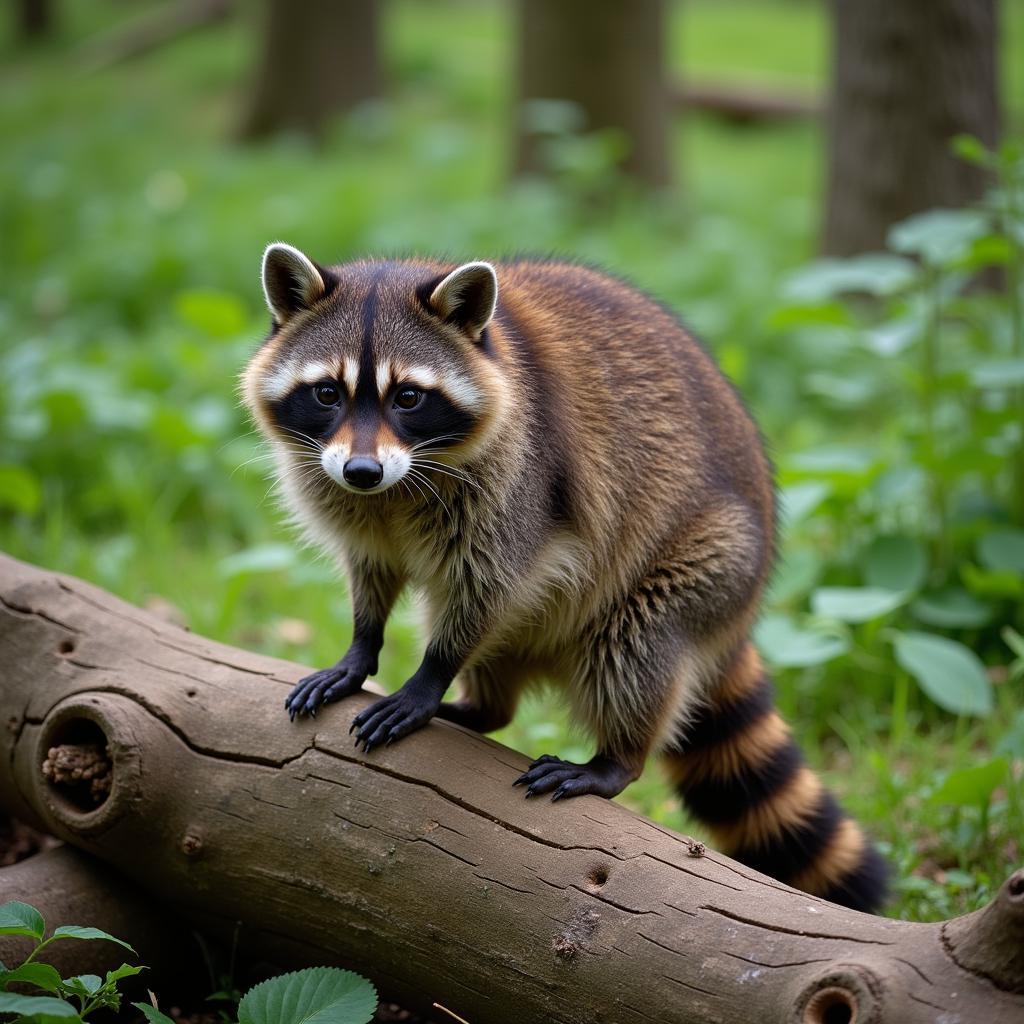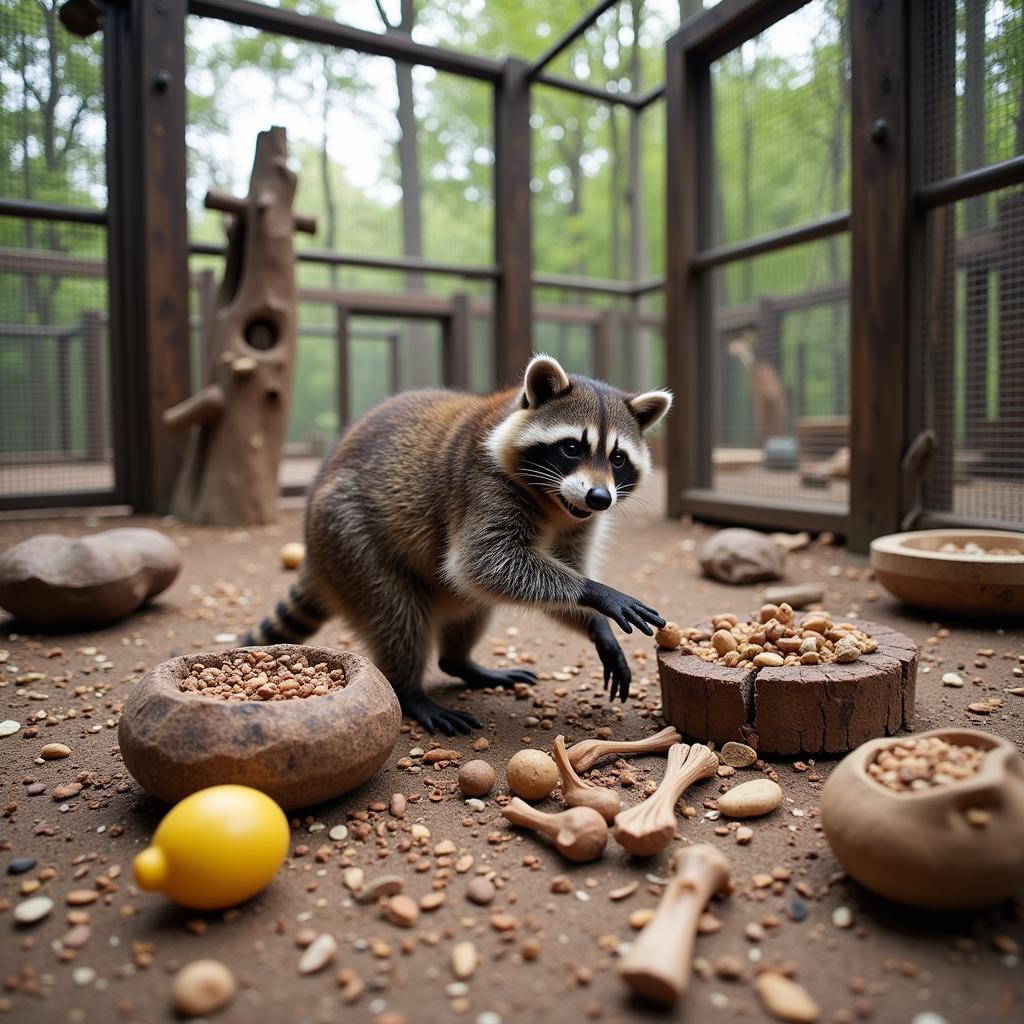How to Responsibly Adopt a Raccoon: A Comprehensive Guide
October 26, 2024Adopting a raccoon is a big decision, and it’s not the right choice for everyone. While these masked bandits may seem adorable, they require specialized care and a deep understanding of their unique needs. Before welcoming a raccoon into your home, it’s crucial to thoroughly research and consider the responsibilities involved.
 Raccoon exploring the wilderness
Raccoon exploring the wilderness
Understanding the Commitment: Raccoons as Pets
Raccoons are wild animals, and unlike domesticated pets like cats or dogs, they haven’t undergone centuries of breeding to coexist peacefully in human homes. Their natural instincts, while fascinating to observe, can present challenges for even the most dedicated owners.
Here’s a breakdown of key factors to consider:
- Legality: Check your local laws and regulations regarding raccoon ownership, as it’s prohibited or heavily restricted in many areas.
- Lifespan: Raccoons can live up to 15 years in captivity, representing a long-term commitment.
- Socialization: Early and ongoing socialization is vital to help raccoons acclimate to human interaction and minimize potential behavioral issues.
- Housing: Raccoons are intelligent and curious creatures, requiring a spacious and stimulating enclosure that mimics their natural environment.
- Enrichment: Providing ample opportunities for foraging, climbing, and exploring is essential for their mental and physical well-being.
Finding a Reputable Source
If, after careful consideration, you’re certain about adopting a raccoon, it’s paramount to find a responsible and ethical source.
- Licensed Rehabilitators: Contacting licensed wildlife rehabilitators or sanctuaries is the ideal route. These professionals specialize in caring for orphaned or injured raccoons, and they can determine if an animal is suitable for adoption and provide guidance on proper care.
- Avoid Breeders: Steer clear of breeders who commercially exploit raccoons for the pet trade, as this practice raises ethical concerns and often prioritizes profit over animal welfare.
 Raccoon engaging with enrichment items in its enclosure
Raccoon engaging with enrichment items in its enclosure
Creating a Safe and Stimulating Environment
Raccoons are highly adaptable creatures, but replicating key aspects of their natural habitat is essential for their well-being in captivity.
- Spacious Enclosure: A secure outdoor enclosure with ample climbing structures, branches, and hiding spots is crucial.
- Water Features: Raccoons are drawn to water and enjoy splashing and playing in it. A shallow pool or tub provides enrichment and helps them stay cool.
- Diet and Nutrition: A commercially formulated raccoon diet supplemented with fresh fruits, vegetables, and occasional treats like mealworms offers balanced nutrition.
- Veterinary Care: Finding a veterinarian experienced in treating exotic animals, including raccoons, is essential for regular checkups and addressing any health concerns.
Responsible Raccoon Ownership: A Lifelong Commitment
Adopting a raccoon isn’t a decision to be made lightly. It demands a significant commitment of time, resources, and responsible care to ensure the animal’s physical and emotional well-being. Thorough research, preparation, and a genuine understanding of raccoon behavior are fundamental to providing a safe and enriching environment for these fascinating creatures.
FAQs about Adopting a Raccoon
Q: Can I train a raccoon like a dog?
A: While raccoons are intelligent and capable of learning, their training differs significantly from that of domesticated animals. They may learn basic commands, but their natural instincts can make them less predictable and obedient than traditional pets.
Q: Are raccoons good with children?
A: Raccoons can be unpredictable, and their natural behaviors, such as biting and scratching, can pose risks to children. It’s generally not recommended to keep raccoons in homes with young children.
Q: What do I do if I find an orphaned or injured raccoon?
A: Contact a licensed wildlife rehabilitator immediately. They have the expertise and resources to care for wild animals in need.
Q: Are raccoons nocturnal?
A: Yes, raccoons are primarily nocturnal, meaning they are most active at night. This can be a consideration for potential owners who prefer pets with daytime schedules.
Q: What are the signs of a healthy raccoon?
A: A healthy raccoon has bright eyes, a clean and shiny coat, and is active and alert. Any signs of lethargy, discharge from the eyes or nose, or difficulty breathing warrant immediate veterinary attention.
Need More Information?
For additional resources and guidance on responsible raccoon care, please visit our website or contact us at:
Phone: 0915117113
Email: [email protected]
Address: Tổ 3 Kp Bình An, Phú Thương, Việt Nam, Bình Phước 830000, Việt Nam
Our dedicated team is available 24/7 to answer your questions and provide support.